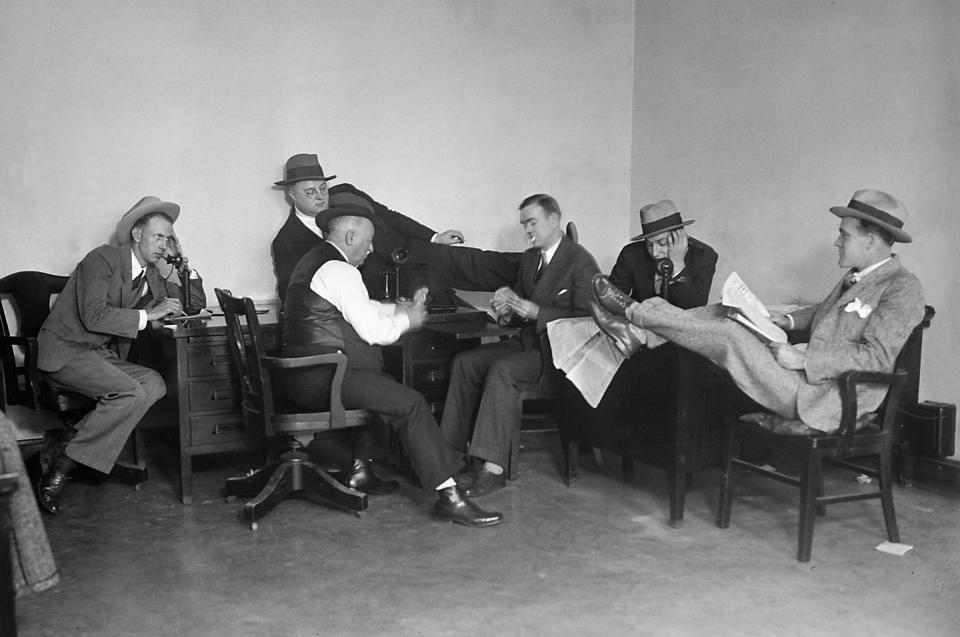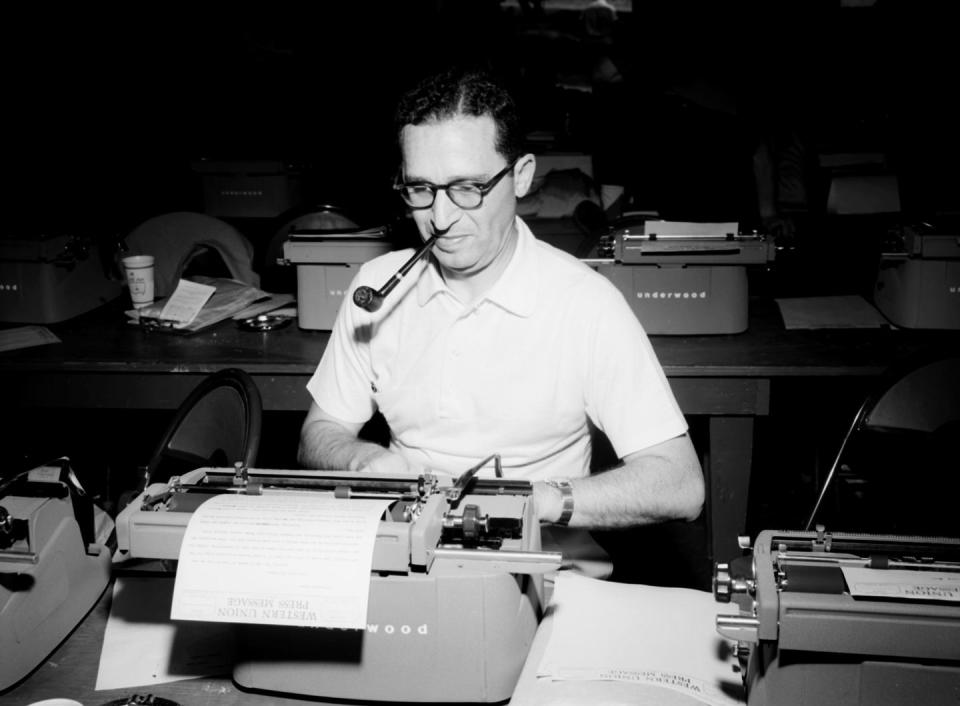What It’s Like Being an LGBTQ+ POC Journalist and How I Found Solace in Writing

For as long as I can remember, I always wanted to be a writer. Whenever I would say this to my family, they would look at me with disbelief and asked why I didn't just want to be a flight attendant or something "creative". There are two parts as to why they would say this to me: they themselves had never seen a Latino journalist and my obvious homosexuality didn't allow them to view me as a "real man" therefore I should have submitted myself to more typically feminine careers. The word 'faggot' has never been thrown at me socially, but within my own family, I've heard it more times then I'm comfortable with.
After completing college (where I studied to be a writer) I thought the previous hesitations my family held about my career choice would either dissipate or I could distance myself far enough to never hear again. I was wrong... With most jobs and positions I've held, I've been the only brown LGBTQ+ face. The same (toxic) hesitations my family would spew, I would go on to experience from other writers and editors who either failed to realize their privilege or just didn't care. Here's are a few things I've learned over the years...
You tone down your "ethnic" qualities.
Working as a staff member for a magazine was a dream of mine since I interned in college. I felt that I had finally achieved my dream job and my career was underway. With those thoughts and ideas I would attend creative meetings with editors and other writers, but more often than not, I would be the only brown person there. During an early meeting, an editor comedically complained about his boyfriend leaving him for a "spicy Latino". Laughter erupted from everyone except myself. As someone who identifies with being Latino, I felt uncomfortable with the characterization of my ethnicity and immediately managed my Latino-ness in a way to protect myself from being part of similar jokes. In season one of the show Insecure, a black main character who works in an all-white office is asked to speak with another employee about toning down their blackness. This situation highlights what happens when there is only one or two POC employees in a company that is dominated by a generally white environment and their eccentric behavior is tied to their race or ethnicity.

According to a 2015 article from The Atlantic, "In particular, black professionals had to be very careful to show feelings of conviviality and pleasantness, even—especially—in response to racial issues. They felt that emotions of anger, frustration, and annoyance were discouraged, even when they worked in settings where these emotions were generally welcomed in certain contexts—think litigators interacting with opposing counsel, or financial analysts responding to a stressful day on Wall Street. Interestingly, this often played out at trainings meant to encourage racial sensitivity. Many of the black professionals I interviewed found that diversity trainings—intended to improve the work environment for minorities—actually became a source of emotional stress, as they perceived that their white colleagues could use these trainings to express negative emotions about people of color, but that they were expected not to disclose their own honest emotional reactions to such statements."
The lack of representation leaves you disheartened.
During one meeting with an editor on how we could cover the 2017 Hurricane Maria crisis in the Caribbean, I pitched a story on how readers could actively donate time and money in cities like New York for those affected. The editor thought it was a great idea and assigned the story to me with a later deadline. A day later, I began researching online when I saw the same editor from the same magazine had just written the piece he assigned me. When asked why he went ahead and wrote it, he responded with: "I changed my mind late last night" One of the islands most affected was Puerto Rico and as a Puerto Rican from the island, I felt a certain responsibility to write something since many other publishers weren't at the time.

Not only did I feel like my voice was taken from me, but it was replaced by someone who had no context or invested interest in the issue. This type of appropriation is fairly common and the ones that are doing it don't even realize it. In May 2020, Suzy Exposito became the first Latina to write a cover story and for featuring the first urban Latino artist at Rolling Stone. For context, the magazine has been running since 1967. Why haven't anymore LGBTQ+ POC journalist been recognized in this fashion? According to a Pew Research Center article from 2018, 77% of newsroom employees are non-Hispanic whites. The numbers are even less for LGBTQ+ journalists. The lack of diversity in creative industries can be traced all the way down to how we were raised and taught to choose professions that would bring in high salaries like a doctor or lawyer, but it's important to give minorities in creative industries opportunities and empower them when the time is right.
We sometimes lose our voice.
As someone who is a member of the LBGBTQ+ community, pitching stories can sometimes be a double-edged sword. We don't want to be pegged as just an LGBTQ+ writer especially if we have other interests. It's another way of toning down yourself as to not be a stereotype. I was once selected to be the spokesperson for a person of color PRIDE campaign at work without actually applying for it. While it was gratifying to assist such a great project, it was clearly because no one else like myself was present. Manifesting voicelessness during similar situations is common and we're left with just caricatures of ourselves. According to the Human Rights Campaign, "only 22 states prohibit discrimination based on sexual orientation and gender identity."

In one of my first jobs post-college, I was acting as an assistant. During one campaign, a famous celebrity showed up for a recording and had brought along her crew who all spoke Spanish together. After they left, my boss at the time cracked a joke about the celebrities friends sounding like parrots and went on to mimic them much to the amusement of the entire office. Being my first job, I didn't have the tools to handle what was going on and felt deflated. Was my language funny? Was it okay to compare it to a bird? I ended up leaving that job for a myriad of different reasons but no one should have to be exposed to those things when they are professionally developing. Being a minority on top of another minority, our opinions and experiences are different. While some may view this as a disability, it should be viewed as a benefit. The need for creativity in a creative industry is essential and having a different view-point is almost always required. Utilizing your 'otherness' for good can take you further.
The 'me against the world' mentality.
Since we're already outnumbered, it makes it easy to fall into a 'me against the world' attitude. This tricky mess of a mindset can be a disability in most cases. But it's one that may or may not be validated in certain situations. Back in 2018, a white coworker was fired for posting inappropriate and racially charged Instagram photos. As a member of the companies diversity group, I thought it would be a great time to go over some new sensitivity training with the staff since most of them didn't fully understand why the person was let go. I passed the idea to the head of human resources and their response was "I don't want to be that person suggesting it since I'm already a person of color." The head of human resources felt that by hosting any trainings, it would have been seen as a retaliation when in reality, it was severely needed.

According to a Forbes article from 2019, "A report discussing the idea of emotional tax for people of color in the workplace found 58% of Asian, Black and Latin employees are on “guard.” Emotional tax is defined as the combination of feeling different at work because of gender, race and or ethnicity and the associated implications on thriving at work. On guard is defined as consciously preparing to deal with potential bias or discrimination. Those feelings also affect retention as 38% report they are more likely to consider leaving their job." This type of emotional tax and on guard feeling is something that I've had in every single job I could think of. Even today, am I not getting certain assignments because I'm not a cute white guy?
You find happiness in different ways.
On a press trip earlier this year, I was part of a round-table discussion with other journalist on what it was like being a POC LGBTQ+ journalist. The meeting consisted of mostly POC writers with a few other white reporters. We were able to share the commonality minority writers share and most importantly were able to communicate it in a way that made the white writers understand the differences. It felt special to me to be able to convey my feelings of being different with an audience that appreciated the struggle with an empathic eye.

While there's a lot that can and should be different for minority journalists, it's great to see writers like Suzy Exposito and Phillip Picardi making headway not only for themselves, but for people of color and members of the LGBTQ+ community. Whenever we lose our voices, it's ultimately up to us to get them back. We do this by continuing to write, continuing to reach out to different publications and continuing to reaffirm our identities even if we're the only ones. Your voice and perspective are just as important as anyone else's.
Even today, my family doesn't understand exactly what I do as a freelance journalist and I've grown to accept they simply choose not to understand. While this type of feedback isn't ideal for a developing child or adult, it has ultimately resulted in some of the best writing I've ever done. My differences do define me and I wouldn't have it any other way. My solace lies in the fact that as a gay Puerto Rican man and the first journalist in my family, I have the ability to be heard...even if it's just a peep.
You Might Also Like


